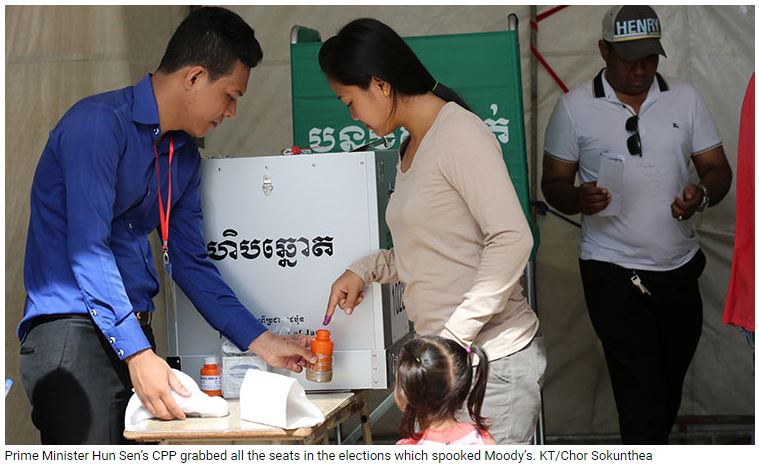Cambodia: Elections threaten foreign financial support: Moody’s
Moody’s yesterday warned the recently concluded general elections in Cambodia have raised the risk of international financing and aid agencies withdrawing their support for the country.
The Financial Times yesterday quoted Moody’s saying Cambodia’s July 29 election which saw the ruling Cambodian People’s Party under strongman Prime Minister Hun Sen winning all the 125 seats up for grabs as a bad omen.
The election outcome increased risks to continued foreign financial support with a number of Cambodia’s major donors, including Australia, Canada, US and the EU voicing concerns about the credibility of the polls, Moody’s analysts Amelia Tan and Matthew Circosta said in a research note.
“If those international donors withdrew aid assistance or imposed economic sanctions, that would hinder financing for the [Cambodian] government and balance of payments,” the analysts wrote.
They said it would also weigh on real [gross domestic product] growth, adding that such moves would have “significant credit-negative effects” on Cambodian sovereign debt.
“Cash from the US, EU members and institutions and Australia accounted for about 43 per cent of Cambodia’s net official development assistance funding or about around 8 per cent of total government revenue in 2016,” the rating agency’s analysts noted.
They said aid and foreign direct investment inflows have helped finance the large current-account deficit and have bolstered foreign exchange reserves, which were at a record high of $12.25 billion in June 2018 (around 55 per cent of 2017 GDP).
The analysts said, that “strong growth in garments and footwear exports, which accounted for about 73 per cent of all goods exports and 36 per cent of GDP in 2016, is largely underpinned by Cambodia’s preferential tariff access with the US and EU”.
Stephen Higgins, managing partner for the Mekong Strategic Partners told Khmer Times that the report from Moody’s seems negative about Cambodia.
“It’s clearly not positive to have these foreign governments expressing this level of concern regarding Cambodia. We’ve seen how reputational risk has slowed down the level of investment in Myanmar,” he said.
He said he is less concerned about the threats of withdrawal of official development assistance but is more concerned about the withdrawal of the everything but arms status, which could have substantive effects on the broader economy.
From 1993 to the end of 2017, Cambodia signed concessional loan agreements with development partners valued at $9.685 billion, data from the Ministry of Economy and Finance released in March showed.
It said the government borrowed $6.377 billion from countries on a bilateral basis. Of this, $4.05 billion came from China, $1.235 billion from Japan, and $145 million from France and, Cambodia borrowed $3.307 billion from multilateral development partners.
The Asian Development Bank provided $2.119 billion, the World Bank $968.35 million, the International Fund for Agriculture Development $138.46 million, Nordic Development Fund $12 million and the OPEC Fund for International Development $69.80 million.
In the last 24 years, Cambodia has made debt service payments of about $1.14 billion to development partners, while last year alone it repaid about $210 million.
Economy and finance secretary of state Vongsey Visoth said in January that Cambodia’s current debt-to-GDP ratio was 32 or 33 percent, which was a healthy level of indebtedness, and should not preclude the country from continued borrowing.
He said that the government planned to reduce its foreign debt by raising capital by issuing bonds,
“We are also developing the local bond market which will be online by 2019,” he said, adding that the government planned to issue bonds in the near future, and was preparing the legal groundwork and infrastructure that would allow this to happen.
“Borrowing locally entails lower levels of risk than borrowing from abroad. When we borrow from abroad, we need to pay it back, which affects the current account and the balance of payments. When we borrow domestically, the money stays in the country.”
Public expenditure this year will amount to $6.4 billion, 18.75 percent of GDP, as indicated in the national budget for 2018. Government income is projected to reach $4.6 billion.
Source: https://www.khmertimeskh.com/50519682/elections-threaten-foreign-financial-support-moodys/


 English
English




